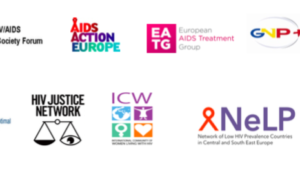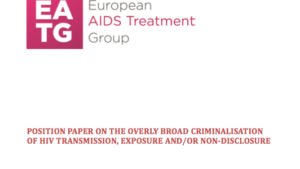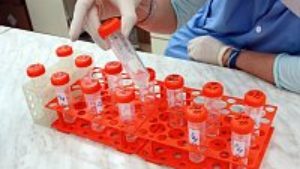Overview
Czechia does not have an HIV-specific criminal law but people have been prosecuted under general disease and harm provisions.
Two sections of the Czech Criminal Code relate to ‘spread of an infectious disease’. Section 152 criminalises intentional transmission, with a penalty of six months to three years’ imprisonment, disqualification or forfeiture of items. The sentence can be increased to up to eight years in certain circumstances including if the act causes serious injury and up to 12 years if the act related to more than one person or causes death. Section 153 of the Code criminalises negligent transmission, punishable by up to one year imprisonment, disqualification or forfeiture of items. Again, the sentence can be increased to up to six years in certain circumstances including if the act causes serious injury, eight years if they grossly violated public health laws, and 10 years if the act causes the death of more than one person.
While sections 152 and 153 are titled ‘spread of an infectious disease’, their wording suggest that these provisions criminalise both actual transmission and ‘exposure’, as they include acts which ‘increase the risk of introduction or spread of a contagious disease’. This was confirmed by a 2005 ruling by the Czech Supreme Court which found that any unprotected sex by a person living with HIV can result in proseuction, with no defence available if a partner was aware of the person’s HIV-positive status and consented to the act. ‘Exposure’ is likely to only be punishable with the lower sentence, while transmission may receive a higher penalty for causing ‘serious injury’.
Furthermore, section 145 of the Code, which relates to causing serious bodily harm, may also be applied. This provision can result in imprisonment ranging from three to 16 years, depending on the circumstances.
Under an administrative communicable disease law there is an obligation to undergo medical testing and treatment, refrain from certain activities, and to disclose HIV status to health care providers, at threat of a fine. Officially, non-disclosure should not result in criminal liability, however the civil society organisation, Czech AIDS Help Society, reported that criminal prosecution occurred in at least one case.
In 2015, an amendment to public health law was proposed, which would have allowed the introduction of mandatory HIV testing of some people from high risk groups, including men who have sex with men. Community advocates mounted a campaign against the amendment and ultimately, the proposal was unsuccessful.
Prior to 2015, Czechia had four known cases of HIV criminalisation, none of which resulted in transmission. These included three prosecutions of gay men for HIV exposure (1998, 2004, and 2004), with sentences ranging from five months to three and a half years. The fourth case (2012) involved an 18 year old HIV-positive pregnant woman who was prosecuted for having condomless sex without disclosing her HIV status. She was sentenced to two and a half years’ imprisonment.
Since 2015, there has been a significant surge in HIV-related prosecutions. Between October 2015 and December 2018, 15 cases were reported, making Czechia a global HIV criminalisation hotspot, ranked second in the world (after Belarus) for prosecutions per capita of people diagnosed HIV-positive (5.5 prosecutions per 1000 people living with HIV) as of December 2018. In its 2023 report, HIV Criminalisation in the EU, AIDS Action Europe cites data from the Czech AIDS Help Society, which is aware of about 20 cases of HIV criminalisation in the last 10 years, the vast majority of which involved men who have sex with men, however one case of vertical transmission has also been recorded. Further, the report notes that HIV status can also be used as an aggravating factor in sentencing for other offences such as rape and sexual assault.
Recent prosecutions have included those of female sex workers, including one woman charged for having condomless oral sex (no transmission), who had her sentence reduced by the High Court to five years. Another case involved a gay man extradited from Thailand after allegedly transmitting HIV to more than one person, who also had his initial sentence reduced. In 2018, the court considered the case of a young HIV-positive man who had condomless sex with five women (no transmission), with the Prague Supreme Court upholding a non-custodial/three year suspended sentence.
In 2016 there was a notorious case in which Prague’s Public Health Authority passed files to the police of 30 gay men living with HIV who had been diagnosed with a sexually transmitted infection. The Authority considered an STI diagnosis as proof that the men had practiced condomless sex, violating the Criminal Code (per the 2005 Supreme Court ruling, above). Eventually, charges were dropped against all of the men. The lack of success has led the Public Health Authority to refrain from filing criminal complaints for alleged HIV exposure.
The recent approach to sentencing suggests that higher level courts may be developing a better understanding of HIV science, and consequently a less severe response to HIV. Furthermore, the Czech Supreme Court has recently acknowledged, following an intervention by the Czech AIDS Help Society, the importance of viral load when assessing risk of HIV ‘exposure’ or transmission, and in one case, police decided to drop charges against an HIV-positive man who was accused of HIV exposure when he proved that he had an undetectable viral load. AIDS Action Europe reports that this ruling is not widely known among legal practitioners, but is able to be referred to by defence lawyers.
Laws
Penal Code
Section 152. Spread of infectious human disease
(1) Any person who intentionally causes or increases the risk of the introduction or spread of a contagious disease in humans shall be punished by imprisonment for six months to three years, by prohibition of activity or forfeiture.
(2) The offender shall be liable to imprisonment for two to eight years,
(a) commits an act referred to in paragraph 1 as a member of an organized group;
(b) if he / she commits such an act in a state of threat or state of war, natural disasters or other events seriously endangering the life or health of people, public order or property,
(c) if he / she violates an important obligation arising from his / her employment, occupation, status or function or imposed by law under such act; or
(d) it causes serious injury to such an act.
(3) The offender shall be punished by imprisonment for three to ten years if he / she causes serious injury to at least two persons or death by an act referred to in paragraph 1.
(4) The offender shall be punished by imprisonment for five to twelve years if he / she causes the death of at least two persons by the act referred to in paragraph 1.
(5) Preparation is punishable.
Section 153. Spread of infectious human disease through negligence
(1) Any person who negligently causes or increases the risk of the introduction or spread of a contagious disease in humans shall be punished by imprisonment of up to one year, by prohibition of activity or confiscation.
(2) The offender shall be punished by imprisonment for six months to three years,
(a) if he / she commits the offense referred to in paragraph 1 in a state of emergency or state of war, a natural disaster or other events seriously endangering the life or health of people, public policy or property;
(b) if he / she violates an important obligation arising from his / her employment, profession, status or function or imposed by law under such act; or
(c) it causes serious injury to such an act.
(3) The offender shall be liable to a term of imprisonment of one to six years,
(a) if he causes death by the act referred to in paragraph 1; or
(b) if it causes the act referred to in paragraph 2 (a) to: (b) severe personal injury.
(4) The offender shall be punished by imprisonment for two to eight years if he commits the offense referred to in paragraph 3 on the grounds that he / she has grossly violated the laws for the protection of public health.
(5) The offender shall be punished by imprisonment for three to ten years if he / she causes at least two persons by the act referred to in paragraph 1 for a gross violation of public health protection regulations.
Penal Code
Section 145. Serious bodily harm
(1) Whoever intentionally causes serious injury to another person shall be punished by imprisonment for three to ten years.
(2) The offender will be punished by imprisonment for five to twelve years if he commits the act referred to in paragraph 1
(a) on two or more persons,
(b) on a pregnant woman,
(c) on a child under the age of fifteen,
(d) on a witness, expert or interpreter in connection with the performance of their duty,
(e) on a healthcare worker in the performance of a healthcare job or profession aimed at saving life or protecting health, or on another person who fulfilled his or her similar duty to protect life, health or property resulting from his or her employment, profession, position or function or imposed on him or her by law,
(f) on another because of his real or perceived race, belonging to an ethnic group, nationality, political belief, religion or because he is really or supposedly without a religion,
(g) again or after he has committed another particularly serious crime involving the intentional infliction of serious injury or death or his attempt, or
(h) from a reprehensible motive.
(3) The offender shall be punished by imprisonment for eight to sixteen years if he causes death by the act referred to in paragraph 1.
(4) Preparation is a criminal offence.
Act of July 14, 2000 on protection of public health and amendment to some related Acts
Measures against Spreading of Contagious Diseases by Natural Persons Secreting Infectious Germs
Additional Public health regulations:
(1) A natural person, who has been infected by a human immunodeficiency virus, and a natural person, who, following typhoid fever, paratyphoid fever A, B and C, bacillary dysentery, salmonellosis, diphtheria, viral liver inflammation B, C and D, tuberculosis, syphilis and gonorrhea, secretes infectious germs for a prolonged period of time, where such fact has been notified to him(her) or the legal representatives thereof (hereinafter a “carrier”), shall be obliged
(a) to undergo medical supervision, necessary laboratory examination, treatment and other epidemiological measures,
(b) to follow the instructions of the doctor on protection of other natural persons against transfer of a contagious disease of which (s)he is a carrier,
(c) not to carry out activities in which the health of other natural persons would be endangered given the fact of him(her) being a carrier,
(d) to inform the doctor of the fact of him(her) being a carrier, prior to examination or medical operation and on admission to institutional care; if the carrier has lost consciousness, (s)he shall do so immediately when enabled by his(her) health condition,
(e) to disclose the fact of him(her) being a carrier at his(her) admission to a facility of social care,
(f) to provide his(her) physician, with whom (s)he is registered,11) with personal data (name, surname, date of birth, place of permanent and temporary residence), data on employment and changes in such data.
Acknowledgements
Our thanks to Hall & Wilcox and the Czech AIDS Help Society for their assistance confirming current relevant legislation and cases.
HIV Justice Network's Positive Destinations
Visit the Czechia page on Positive Destinations for information on regulations that restrict entry, stay, and residency based on HIV-positive status, as well as access to HIV treatment for non-nationals.








